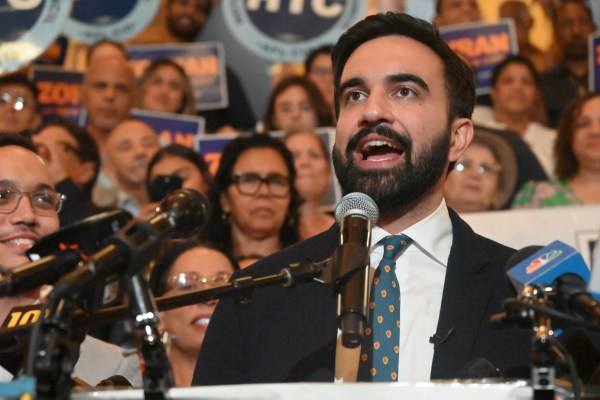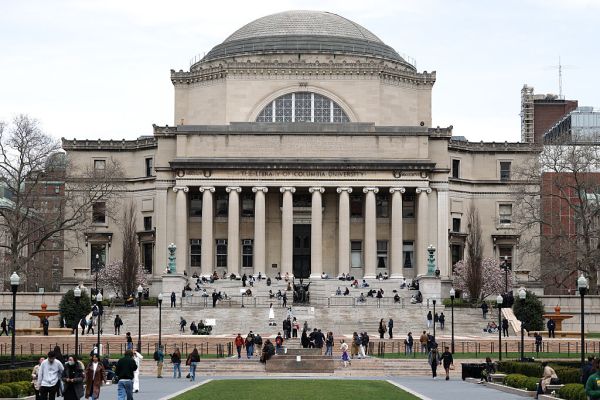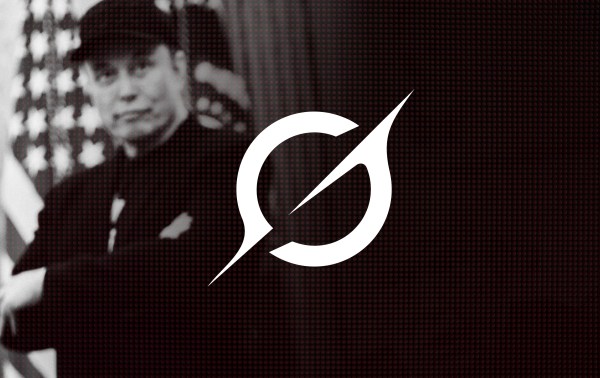In May, Americans were shocked by the brazen murder of two Israeli Embassy staffers in Washington, D.C. It was the latest tragic episode in a surge of antisemitic violence across the country, from college campuses to the streets of our capital city. Jewish Americans are understandably alarmed, and many of our country’s political leaders have condemned the violence and hate as “un-American.”
Are they right? Are these antisemitic attacks un-American? We should be very careful in using the word “un-American.” It has a history of being misused, and sometimes used in dishonest ways. As Americans, we rightfully prize our freedom, and being a free society means that we give a wide berth to all sorts of opinions and differences.
But our freedom does presuppose something important: a shared respect for the fundamental values that are basic to the American way of life. Those are the values and the vision conveyed in our Declaration of Independence, the belief that all men are created equal and have a natural right to their life, their liberty, and their pursuit of happiness.
It is vital to recognize the deep Jewish roots of those ideas. Go to any church in America, sit down and pick up the Bible, and what is the first book that you come to? The first book, of course, is Genesis, followed by Exodus, Leviticus, Numbers, and Deuteronomy—the first five books of the Jewish Torah, followed by the rest of the Hebrew Bible (or Tanakh). These books were part of the Old Testament that the settlers who built America carried with them when they came to our shores, the texts from which our Founders drew their inspiration for the principles behind our political tradition. As one of us has previously written with Pete Peterson, the Hebrew Bible shaped foundational principles including the separation of powers, our sense of justice, and the exalted vision of human dignity at the heart of our nationhood.
That spirit is what binds us all together as Americans. We may, and we do, have differences of opinion on how best to achieve a good society, and that alone does not make any of us un-American. What does make someone un-American is when they reject our fundamental principles and turn against them altogether.
The alarming surge of antisemitism is becoming an increasingly open and troubling feature of nearly all Western societies, including our own. It has even taken root on our college campuses, which are supposed to be bastions of free thought and inquiry. This surge threatens to become a tidal wave, with potentially terrifying consequences.
A few incidents in just the past few months make the point. A New York man pleaded guilty in February to threatening a synagogue in Albany with firearms; and then the aforementioned gunman who remorselessly pumped 21 bullets into two young Israeli Embassy employees outside the Capital Jewish Museum in Washington in May; followed by the attack in Colorado allegedly by an Egyptian citizen, in the country illegally, who threw Molotov cocktails at demonstrators supporting Israeli hostages in Gaza, killing an 82-year-old Jewish woman. This kind of barbarism is becoming too commonplace in our country. It is against all that we stand for, and it cannot be allowed to continue.
And that is why it is important to insist that antisemitism is un-American. It is not enough to just say that such criminal acts violate our laws. They offend our fundamental beliefs about the freedom and dignity of the individual person, ideals that America pioneered at its founding and that the nations of Europe and most of the civilized world claim to honor.
For Americans, nothing expresses the distinctively American view of the matter better than George Washington’s letter to the Hebrew congregation at Newport, Rhode Island, in 1790. It's a beautiful letter and one that should make every American proud to read. Here is the most important message:
The citizens of the United States of America have a right to applaud themselves for having given to mankind examples of an enlarged and liberal policy: a policy worthy of imitation. All possess alike liberty of conscience and immunities of citizenship. It is now no more that toleration is spoken of, as if it was by the indulgence of one class of people, that another enjoyed the exercise of their inherent natural rights. For happily the government of the United States, which gives to bigotry no sanction, the persecution no assistance requires only that they who live under its protection should demean themselves as good as citizens, in giving it on all occasions their effectual support.
Washington enunciated general principles that should apply to all men and women because of their inherent natural rights. He was also writing as the first American president, specifically to a Jewish audience, making clear his recognition that Jews have a long history of having been subjected to bigotry and persecution—but that in the United States of America, this new country, things would be different.
Washington continued in the same vein, concluding the letter with these words of benediction:
May the children of the stock of Abraham, who dwell in this land, continue to merit and enjoy the goodwill of the other inhabitants; while everyone shall sit in safety, under his own vine and fig tree and there shall be none to make him afraid. May the father of all mercies scatter light and not darkness in our paths, and make us all in our several vocations useful here, and in his own due time and way everlastingly happy.
America has, indeed, been an incomparably wonderful land for Jewish people, a land in which they have been able to flourish and achieve according to their own abilities and their own hard work. It also is equally true that America owes a profound and incalculable debt to those Jews who helped foster principles upon which much of the American experiment in democratic self-government was erected. Jewish Americans have helped our nation find cures for many of the worst illnesses, helped it become an economic and cultural juggernaut, and helped enrich our legal tradition. The Jewish people have contributed in ways large and small to the soul of America, both its making and improving.
But suddenly this all seems to be changing. In the months after the brutal October 7, 2023, attack on Israel by Hamas terrorists, while the vast majority of the American people have not wavered in their support of Israel and the Jewish people, some of our most eminent university campuses became overrun by antisemitic mobs. These are not demonstrators exercising their First Amendment rights of “peaceable” assembly. These are mobs who barricaded buildings, screamed obscenities, and committed acts of violence and vandalism.
So, is antisemitism un-American? Without a doubt it is. Fortunately, the vast majority of Americans are not antisemitic, and see antisemitism as a grave threat. They believe in that vision in our Declaration of Independence and want to work to get us ever closer, as we previously had been doing, to realizing it in full.
The Founders adopted the Exodus story as a symbolic expression of America's quest for liberty against the tyranny of worldly kings who counted themselves above the law. In that way, as in so many other ways, the American story and the Jewish story have been intertwined—and to negate one is to negate them both. We can't let that happen if we are to continue as the land of the free.






Please note that we at The Dispatch hold ourselves, our work, and our commenters to a higher standard than other places on the internet. We welcome comments that foster genuine debate or discussion—including comments critical of us or our work—but responses that include ad hominem attacks on fellow Dispatch members or are intended to stoke fear and anger may be moderated.
With your membership, you only have the ability to comment on The Morning Dispatch articles. Consider upgrading to join the conversation everywhere.